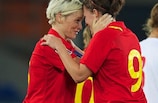Gibraltar hosts women's workshop
Friday, July 25, 2014
Article summary
Several of Europe's smaller national associations have met to discuss their special women's football needs as part of the UEFA Women's Football Development Programme (WFDP).
Article top media content

Article body
The UEFA Women's Football Development Programme (WFDP) involves UEFA and its 54 member associations working in tandem for the overall benefit of the women's game.
The know-how, advice and resources accompanying the project are designed to give UEFA and the associations the opportunity to nurture women's football and provides the federations with the chance to develop in accordance with their size and respective needs.
This pragmatic approach – where associations of similar sizes can exchange feedback and expertise, as well as learn from each other – was in evidence at a WFDP workshop hosted by the newest UEFA member, the Gibraltar Football Association (GFA).
In the first UEFA women's football workshop to exclusively feature Europe's smaller national associations, representatives from Andorra, Liechtenstein, Luxembourg, Malta and San Marino joined the host association and UEFA administration representatives in a lively exchange of ideas and opinions on how the women's game can be developed at their level and how they can put effective strategies and plans into operation.
The European body welcomed the opportunity for the smaller FAs to get together and give each other the benefit of their various experiences. The associations each took turns to explain their situation and targets, and asked key questions on topics which were having an impact on the domestic women's game in their country.
Discussions centered on issues such as how to recruit players, including goalkeepers; how to keep young girls in the game at a certain age; promoting women's football; coaching matters and how to attract potential coaches; and refereeing. The associations all emphasised the need to, among other things, work together with schools, organise football festivals and promotional events, and stressed the need for football to be made attractive in its various facets to entice girls and women to become players, referees, coaches or officials.
The 'fun' element was felt to be essential, especially for girls, along with the need to show how playing football was also beneficial for health reasons. Some associations highlighted the advantages of involving parents in activities which might, for example, lead to them taking on refereeing or coaching duties, or acting as fundraisers.
UEFA and the associations discussed various support possibilities such as referee or coaching development programmes, assistance in drawing up a marketing plan, or promotion and education visits by UEFA women's football development ambassadors and experts.
The six associations have taken on board a wealth of information which will strengthen them in meeting UEFA's objective that all member nations should have a women's football development plan by 2016. "We took back a lot with us," said Maria Mifsud, deputy general secretary of the Malta Football Association (MFA), "and we are truly inspired to do more."
"The Gibraltar FA team found this seminar very useful," added the GFA's head of women's football Tracey Baglietto. "It became obvious that, due to our size, we shared the same generic problems with all the other participating small nations. We do think seminars like this one are much more beneficial and effective for smaller nations, as all participants can interact and participate in problem-solving together."










